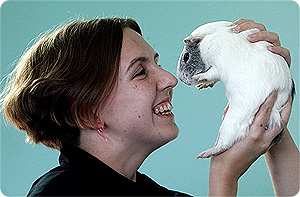Pet Care
GUINEA PIG Pet Care
General Care Information
Guinea Pig Chow Guinea Pigs need plenty of fresh water and food designed specifically for Guinea Pigs – do NOT try and feed your Guinea Pig Rabbit food. Unlike most animals, guinea pigs do not internally generate Vitamin C and therefore will need supplements to their diet. Commercially available guinea pig chow contains about 20% protein, 16% fiber, and about 1 gram of vitamin C per kilogram. These chows have a 6 week shelf life and should be purchased in the amounts that your pet can consume in a 6 week time period. Vitamin C To supplement your pet’s diet with vitamin C, provide drinking water mixed with ascorbic acid – mix 200mg of vitamin C for every 1 quart of water. In addition to drink mixes, give your guinea pig several leaves of cabbage or a quarter of an orange every day. Be sure to wash all fresh fruits thoroughly before feeding. Fresh fruits and vegetables are meant to be supplements and not staples in the diet and therefore should not exceed more than 15% of the daily menu. Water Guinea Pigs should have water made available to them at all times, especially during the hotter seasons of the year. A hanging drops-style water dispenser is a great solution for keeping water from spilling and keeping it free of contaminants. The water dispenser should be refilled with fresh water every two days and should be cleaned with a disinfectant soap and rinsed thoroughly each time it is filled. (see above instructions for supplementing water with Vitamin C.) GUINEA PIG Grooming Clipping nails Guinea pig nails should be trimmed as often as necessary and may not ever need to be trimmed depending on what type of surface your pet is accustomed to. Guinea pigs that spend a lot of time on hard, semi-rough surfaces will naturally wear down their claws to an acceptable length. If your guinea pig mostly lives on soft surfaces, the claws will grow longer into a sharp tip. Using commercially available cat clippers, clip the end of the claws – do not cut the claws too short to avoid injury. Inspecting Teeth Just like other members of the rodent family, the guinea pig’s front two teeth – the incisors – will grow throughout its entire life. Because these teeth are always growing, if they are not worn down naturally or clipped occasionally they will curve into the mouth preventing proper eating resulting in starvation. To care for your guinea pig’s teeth, make sure to provide your pet safe toys to gnaw on such as commercially available chew sticks, tree branches or wood blocks. The natural chewing action will wear down the front teeth to a healthy, acceptable length. If the teeth become too long and are in need of clipping, take your pet into the local veterinarian to have the clipping done. Additionally, if you notice that the teeth are chipped, consult with your veterinarian. Brushing Guinea pigs are fastidious groomers and generally will keep their fur clean by themselves. If you choose to brush your pet’s fur, use a stiff pet brush by applying moderate pressure to remove loose hair and to remove any mats. As you brush, inspect the ears and skin for any signs of mites, fleas or any other kind of skin irritation or abrasion. Bathing Most guinea pigs do not like the water – in fact, the panic induced by a bath can result in unhealthy stress and potential injury. Guinea pigs should not be bathed unless they absolutely need it – for medical reasons, such as fleas, or if they happen to get extremely dirty, mud or sewage. As an alternative to a bath, consider some of the following options:
GUINEA PIG Housing | Other CategoriesGUINEA PIG Pet CareGUINEA PIG Health Information GUINEA PIG Diseases GUINEA PIG Babies GUINEA PIG Products Main CategoriesDOGSCATS HORSES BIRDS RABBITS HAMSTERS MICE AND RATS GUINEA PIGS FISH |
